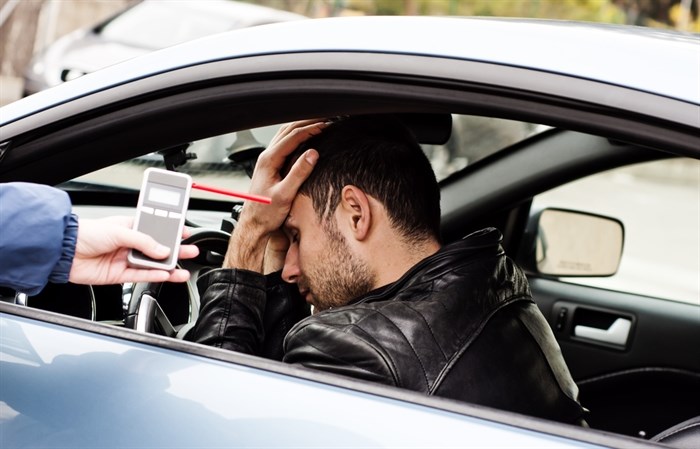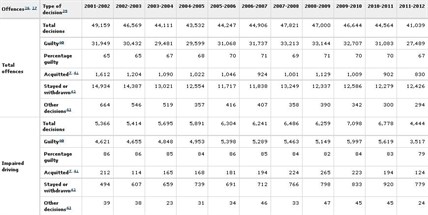
Image Credit: shutterstock.com
March 10, 2015 - 8:30 AM
KAMLOOPS – In 2012, Lee Michael Wilson blew a warning on the breathalyzer after a police officer pulled him over in Kamloops. Police gathered no evidence beyond that and he was found guilty on the spot. He was issued a three-day immediate roadside prohibition, a non-criminal penalty that may result in the loss of a licence and even the vehicle itself.
If that sounds odd or even just wrong to you, a few judges may agree. Wilson fought the case and won, then lost in the B.C. Court of Appeal in a case headed to the Supreme Court of Canada in May. That case will be argued on fine points of law, but It’s just one of the ways drunk driving is rarely a crime, anymore.
These prohibitions have in many cases, replaced the full criminal sanctions of impaired driving. Statistics Canada shows before the prohibition was introduced in the province in 2010, impaired driving prosecutions were the highest in a decade at 7,098. After the legislation came into effect, total impaired driving decisions dropped by 37 per cent, to 4,444 the following year, the last year stats were recorded.
Impaired driving charges—typically a pair of charges for driving with a blood alcohol level of .08 and impaired driving—have largely been replaced by the roadside prohibition. Last year, B.C. drivers were hit with 18,803 prohibitions, though a Freedom of Information request shows those, too, are open to challenge.
In December, 2014, 83 roadside prohibitions were revoked due often to police mistakes falling in one of three categories: Drivers weren’t offered a second test which they were legally entitled to, breathalyzers were proven ineffective or drivers were issued the prohibitions when they weren’t driving their vehicles – either behind the wheel specifically, or they weren’t on a marked road or highway.
According to Vancouver lawyer Kyla Lee, who specializes in these cases — and is Wilson's lawyer — most of her wins are attributed to careless police work.
“A lot of the decisions from the courts have made it more difficult for the police to continue using the same, often sloppy, standard of evidence,” she says.
According to another Freedom of Information request, Kamloops RCMP had an internal investigation in 2013 which discovered many of the breathalyzers used by the detachment were either improperly checked or not calibrated appropriately. Issuing a prohibition relies entirely on whether the breathalyzer registers a warning (between 0.05 and 0.08 per cent blood alcohol reading) or a fail (above 0.08 per cent) after testing a driver.
"It was important to discover the extent of the errors and whether or not the errors could bring... the Immediate Roadside Prohibition program or any criminal code impaired driving investigation into disrepute both legally and ethically," the report states.
Twenty-eight breathalyzers were taken out of service due to botched logs and invalid device certificates. The report recommended three officers get retraining in the program.
Lee says in many circumstances, police issue a prohibition instead of laying criminal charges.
"I think there’s a big issue across the province with the level of training officers are receiving to discern when a (prohibition) is appropriate as opposed to when they should be proceeding with a criminal charge," she says.
Roxanne Engli with MADD Kamloops says since prohibitions were introduced in the province, there were 115 fewer deaths annually from alcohol-related crashes. But she’s unsure if a monetary penalty is dissuading people from driving drunk.
“Tougher laws about drinking and driving? That wasn’t what it was at all,” Engli says. “The only thing that changed was tougher administrative sanctions which mean it would have cost you more if you got caught.”
Engli says she wants to see police receive more resources for a tougher crackdown on drunk driving, beyond the prohibition and criminal charges.
“If people are continuing to drink and drive, we have to do all we can to try and curb it,” she says.
Engli recommends legislators consider mandatory alcohol screening at roadchecks to make it easier for police to catch a drunk driver and counter drivers' willingness to drive after drinking.

*Click to enlarge* Impaired driving charges in the province for the last ten years. 2011/2012 is the latest available data.
Image Credit: statscan.gc.ca
To contact a reporter for this story, email gbrothen@infonews.ca, or call 250-319-7494. To contact the editor, email mjones@infonews.ca or call 250-718-2724.
News from © iNFOnews, 2015